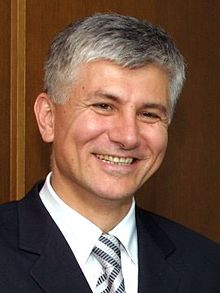Zoran Djindjic
|
Zoran Đinđić PhD |
|
|---|---|
 |
|
| 6th Prime Minister of Serbia | |
|
In office 25 January 2001 – 12 March 2003 |
|
| President |
Milan Milutinović Nataša Mićić (acting) |
| Preceded by | Milomir Minić |
| Succeeded by | Zoran Živković |
| 67th Mayor of Belgrade | |
|
In office 21 February 1997 – 30 September 1997 |
|
| Preceded by | Nebojša Čović |
| Succeeded by | Vojislav Mihailović |
| Personal details | |
| Born |
1 August 1952 Bosanski Šamac, PR Bosnia and Herzegovina, FPR Yugoslavia |
| Died | 12 March 2003 (aged 50) Belgrade, Serbia and Montenegro |
| Nationality | Serbian |
| Political party | Democratic Party |
| Spouse(s) | Ružica Đinđić |
| Children | Jovana Luka |
| Alma mater |
University of Belgrade University of Konstanz |
| Religion | Serbian Orthodox Christianity |
| Signature | |
Zoran Đinđić (Serbian Cyrillic: Зоран Ђинђић, pronounced [zǒran dʑîːndʑitɕ]; 1 August 1952 – 12 March 2003) was a Serbian politician who was the Prime Minister of Serbia from 2001 until his assassination in 2003. He was the Mayor of Belgrade in 1997, and long-time opposition politician and a doctor in philosophy.
Đinđić was one of the original thirteen restorers of the modern day Democratic Party, becoming its president in 1994. During the 1990s, he was one of the co-leaders of the opposition to the administration of Slobodan Milošević, and became the Prime Minister of Serbia in 2001 after the overthrow of Milošević. As Prime Minister, he advocated pro-democratic reforms and the integration of Serbia in to European structures. He was assassinated in 2003 by Zvezdan Jovanović, a former Special Forces operative with ties to the Serbian Mafia.
Đinđić was born in Bosanski Šamac, PR Bosnia-Herzegovina, FPR Yugoslavia where his father was stationed as an officer of the Yugoslav People's Army (JNA). His paternal side hailed from Toplica in southern Serbia. His mother Mila Dušanić, a housewife, raised him and his elder sister Gordana; the family moved according to his father's jobs. Ten years of Zoran's childhood were spent in the town of Travnik. Eventually, the family moved to capital Belgrade, after his mother had gained a post there. Đinđić attended Ninth Belgrade Gymnasium, subsequently enrolling at the University of Belgrade's Faculty of Philosophy, graduating in 1974. During his university days he developed an interest in politics. After being convicted by the communist authorities and through Party-controlled media for his role in his attempt to organize an independent political movement of Yugoslav students, Đinđić emigrated to West Germany thanks to the intervention of former German Chancellor Willy Brandt, who persuaded authorities to let Đinđić come to Germany instead of serving his sentence in Yugoslavia. He continued his studies with professor Jürgen Habermas in Frankfurt.
...
Wikipedia
